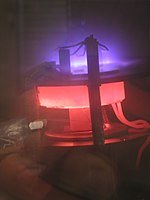
Photo from wikipedia
Abstract Si3N4 deposition from silane and ammonia in a number of III-N MOVPE reactors of various sizes was studied in a wide range of reactor conditions. It was revealed that… Click to show full abstract
Abstract Si3N4 deposition from silane and ammonia in a number of III-N MOVPE reactors of various sizes was studied in a wide range of reactor conditions. It was revealed that Si3N4 deposition rate depends on temperature, pressure, carrier gas type, and ammonia concentration. Deposition rate rises with temperature up to 1050-1100 oC in a manner typical for temperature-activated processes, but under any studied conditions, including the 800-850 oC range, it is strictly linear with SiH4 concentration indicating the absence of high-order parasitic reactions at high temperature and surface passivation at low temperature. For a low-volume reactor the higher the pressure is, the faster the deposition is both for N2 and H2 carrier gases. For large reactors the dependence is non-monotonic. At temperature above 900 oC using H2 as a carrier gas results in a higher Si3N4 deposition rate than when using N2. If nitrogen is used as a carrier gas, deposition rate gradually rises with ammonia concentration. If hydrogen is used, deposition rate rapidly rises with ammonia concentration and then gradually falls. If hydrogen-nitrogen mixture is used as a carrier gas, deposition rate changes in a linear manner with the mole fraction of hydrogen in the carrier gas.
Journal Title: Journal of Crystal Growth
Year Published: 2020
Link to full text (if available)
Share on Social Media: Sign Up to like & get
recommendations!